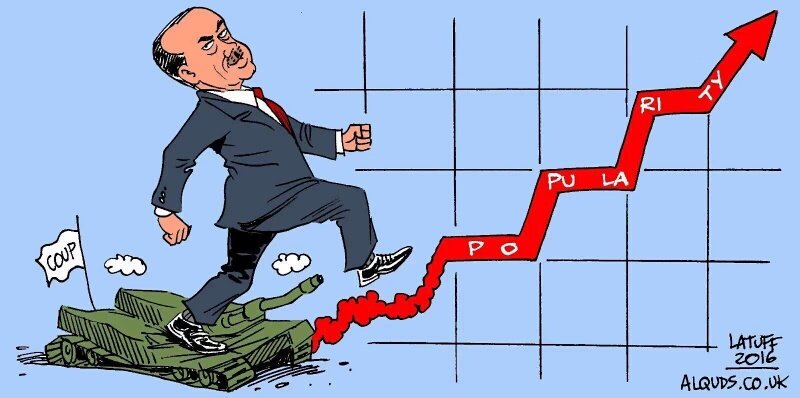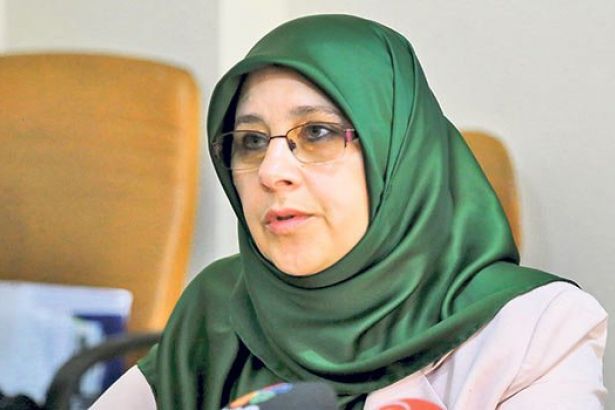



 Ahmet Aslan
Ahmet AslanUnder the guise of weeding out members of the Gulenist cult from various state institutions, Turkish President Recep Tayip Erdogan has embarked upon the wholesale arrest of committed Muslims.
Since the failed Gulenist coups d’état on July 15, 2016, the Turkish government has unleashed its wrath on members of the group and launched a relentless campaign of purges. One of the first actions of the government was to introduce the state of rmergency with an almost unanimous consent of the National Assembly as well as the Turkish public. In the eyes of a majority of Turks, there is no question regarding the culpability of the Gulenists in the failed coup attempt. It is well known that they have been working clandestinely for the past several decades to seize power.
Therefore, the public stood firm against the coup and, regardless of their view of the AKP government’s policies, poured into the streets to defend the elected government and president. In the aftermath of the coup, the public also supported the purge of the Gulenists from the government, military, and judiciary that they had infiltrated over the past four decades. There were some concerns about the state of emergency as it would give unlimited powers to the government and there was a danger that such powers could be abused. The larger public, however, did not share these concerns.
However, recent developments have shown that the concerns about AKP’s misuse of the powers were not entirely unfounded. The AKP has extended the crackdown to Kurds, Muslim activists, and other opposition groups. The state of emergency empowered the Turkish government to issue “rule by decree” on matters relating to “national security.” It has enabled the AKP government to create arbitrary laws without approval of the National Assembly. These laws have the full force of legislation, and they are not subject to restrictions established by the constitution. Therefore, the current state of emergency significantly restricts fundamental freedoms as any criticism of government may be deemed as a threat to national security and consequently suppressed with the “rule by decree.”

A stark example of the crackdown on Muslims is the closure of the Kudus (al-Quds) TV, owned by well-known Turkish activist Nureddin Sirin. Since the early years of his life, Sirin has dedicated his life to struggle for the freedom of Palestine and has been prosecuted many times for his unwavering stance. Due to his support for Palestine, Sirin was arrested after the February 28, 1997 military coup and was convicted for 17.5 years by the pro-Israeli putschists at the time. He was released in 2004. Ten years later, he launched the Kudus TV station. It was supportive of the AKP in its struggle against the Gulenist coup but also criticized government policies on Syria and Iraq. The TV station was also critical of the Saudi war on Yemen.
It is believed that due to its critical stance against government policies on Syria and Iraq and perhaps pressure from the Saudis, the Radio and Television Supreme Council shut down Kudus TV on October 28. The police raided the building housing the TV station and confiscated its equipment and sealed the gates. Based on the “rule by decree,” (No: 668) article 2 and paragraph 4, the Radio and Television Supreme Council, that monitors and regulates TV channels in Turkey, issued its decision to close down Kudus TV on the ground that “it poses a threat to the national security.” The decision stated that a government minister approved the Radio and Television Supreme Council’s decision without mentioning his name.
The decision is arbitrary as it does not mention how the TV station threatened national security. The obvious aim is to suppress a rare critical voice in Turkey. The identity of the owner of Kudus TV, Nureddin Sirin makes the decision quite ironic as Sirin has been the prime target of the Gulenist cult and if the coup had been successful, he would have been among the first people to be arrested. Sirin is currently seeking legal advice and planning to fight his case in court, but considering the government’s control on the judiciary, it will not be an easy task. To fight an arbitrary government decision in the court may be a tall order given the present climate.
Unfortunately, Nureddin Sirin is not the only victim of the AKP repression in Turkey. The government has targeted some other prominent Muslim activists as well. These include Huda Kaya, who was an iconic figure during the post February 28 coup period in Turkey (1997). She vociferously criticized the headscarf ban that was introduced after the coup and organized campaigns and peaceful demonstrations against the ban. At some point, she angered the military elite so much that she and her three underage daughters were arrested. They were put on trial and threatened with capital punishment. She was later released and had to escape to Pakistan to seek refuge there. When the AKP came to power (2004), she and her family returned to Turkey, and in the end, she joined the Peoples’ Democratic Party that is mostly supported by the Kurds. In 2015 she was elected to parliament.

On November 6, Huda Kaya together with some other members of the party gathered in Istanbul to protest against the arrest of their leaders and some of the MPs. Due to the state of emergency, the government has banned all forms of protest. So the police moved in to disperse the group, but the organizers resisted. During the confrontation, a police officer began to yell at Huda Kaya and approached her aggressively. Her son Muhammed Cihad tried to defend his mother but the police officers arrested him, and he was taken to a police station. The police then beat him in the station and broke his spinal column. Due to the state of emergency, no one can hold the police accountable for such torture and brutality that could easily leave him paralyzed for life.
In another incident, Ahmet Faruk Unsal, Chairman of Mazlumder, the leading Muslim Human Rights organization in Turkey, was targeted through his wife. The AKP government has targeted him due to his principled stance in the face of government oppression. Consequently, his wife, who is a lecturer, was sacked from the university for being a member of the Gulenist cult. Ahmet Faruk Unsal is a former AKP MP and has an impeccable reputation as a Muslim activist. His wife also has an impeccable reputation as an activist and nobody, not even the AKP supporters believe that she was a member of the Gulenist cult. Yet, the government decided to punish Ahmet Faruk Unsal through his wife for his opposition to government policies.
These are only some examples but there are many others in which Muslims have been the victims of AKP crackdown. Since the failed coup attempt, the government has used its powers to suppress all form of dissent and has not hesitated to target even Muslim activists who were once victims of a secularist coup. This shows that if political power is not exercised in the framework of taqwa and justice, it does not matter who is in authority. Muslims are also capable of imitating their oppressors if their sole aim is to cling to power.
